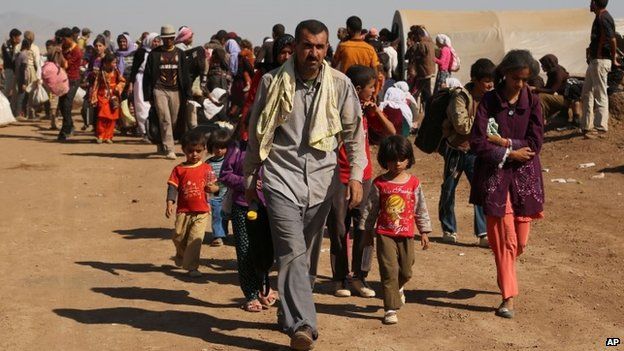Iraq crisis: UK 'will play role' in rescue mission, says PM
- Published

Britain will "play a role" in an international mission to rescue stranded Yazidi refugees in Iraq, Prime Minister David Cameron has said.
Speaking after chairing a meeting of the Cobra emergency committee on the crisis, he said "detailed plans" were being put in place for the operation.
The UK has made a third round of airdrops to the thousands fleeing Islamist fighters across mountains.
Meanwhile, France says it will arm Kurdish forces battling the militants.
The US has also reportedly begun supplying weapons to the Kurdish forces, known as the Peshmerga.
US forces have carried out a number of air strikes targeting militant group Islamic State (IS) near Irbil, the capital of Iraqi Kurdistan, while drones have also fired on jihadist fighters.
'Under review'
The US has also sent 130 more military advisers to the Kurdish region of northern Iraq.
Mr Cameron said Britain's involvement remained a humanitarian mission.
UK Chinook helicopters are expected to arrive in Cyprus later, and RAF Tornado jets are preparing to carry out surveillance operations to support aid deliveries.
The prime minister said: "We need a plan to get these people off that mountain and get them to a place of safety, and I can confirm that detailed plans are now being put in place and are under way, and that Britain will play a role in delivering that."
The prime minister would not say whether the Chinooks would also be used to airlift refugees to safety.
BBC political correspondent Carole Walker said the government had also agreed to transport supplies to Kurdish forces fighting IS militants.
Citing a senior government source, she said this should not be described as "arms".
David Cameron: ''There are detailed plans now being drawn up - Britain will play a role''
"The source said such an operation falls within the government's humanitarian effort as it is to help the Kurdish forces who are doing the most on the ground to protect civilians," our correspondent said.
Asked to respond to demands for Parliament to be recalled, Mr Cameron added: "This is a humanitarian operation that Britain is involved in, so I do not think it's necessary to recall Parliament for that.
"But of course I always keep these issues under review and were things to change, then obviously that is something that could be done."
After the Cobra meeting, Mr Cameron called Iraq's prime minister-designate, Haider al-Abadi, to express support for him and "his efforts to establish an inclusive government as swiftly as possible", Downing Street said.
The UN has warned that tens of thousands of civilians are trapped on mountains in northern Iraq near the Syrian border by fighters from IS.
The BBC's Paul Wood reports on the military strategy to push back the Islamist fighters
Jihadists are reportedly targeting Iraqi Christians and members of the Yazidi religious sect.
About 35,000 people have escaped from the mountains into Syria and on to the Kurdistan region of Iraq in the past three days, with the UN warning they needed "life-saving assistance".
Some 700,000 Yazidis are believed to have been displaced.
International Development Secretary Justine Greening confirmed a third round of UK air drops successfully took place on Tuesday night.
There have now been five drops over three nights, which included 2,640 reusable water purification containers filled with clean water and more than 500 shelter kits to help shade the refugees in temperatures of more than 40C (104F).
A cargo plane loaded with water containers and filtration units flew out of East Midlands Airport on Wednesday.
The containers will be filled with approximately 39,000 litres (8,578 gallons) of water and used in future aid deliveries.
Labour leader Ed Miliband welcomed Mr Cameron's pledge for more action.
He added: "We must play our part in bringing help and relief to those thousands of refugees, and the UK must do all that it can to assist the vital international effort to bring them to safety."
Justin Bronk, a military analyst from the Royal United Services Institute, told the BBC a Chinook helicopter could hold 70-75 refugees if an evacuation was attempted.
Taban Sami Shoresh, a British Kurd helping with the relief efforts, told the BBC she had never seen so many people "scramble for survival" when an aid helicopter landed.
"All they wanted to do was get on the plane to be saved, and we could only take so much. It's horrific. It's heartbreaking to see," she said.
Liam Fox: "They are our enemy and they have to be defeated"
"There is a humanitarian crisis here and we desperately need the help from all directions," she said.
Speaking from Irbil in Kurdish-controlled northern Iraq, Ms Shoresh described how Mount Sinjar was "completely hemmed" by IS fighters.
Meanwhile, Conservative former Defence Secretary Liam Fox told BBC Radio 4's The World at One Britain should join in the airstrike campaign "alongside its US ally" in Iraq.
He said his comments were not a direct attack on the prime minister, saying he was criticising "the Western powers in general" who he said had been "too slow to act over Iraq".
But Conservative MP John Baron said the government was right to focus on humanitarian support.